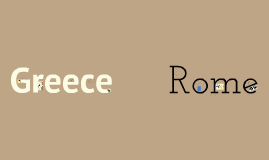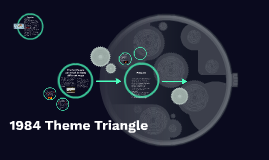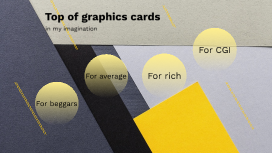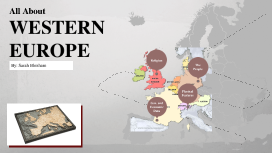Western Europe Powerpoint
Transcript: All About WESTERN EUROPE By: Sarah Bloxham The People What is the Population? 197,508,913 According to worldmeters.info as of Wednesday, September 7, 2022. This information was based upon the latest United Nations estimates. Gender Distribution Gender Distribution The gender distribution is pretty equal is Western Europe. Life Expantancy Life Expantancy Languages What are the Languages in Western Europe? Some of the most commonly spoken languages in Western Europe are English, French, German, Dutch, Welsh, etc. Some examples are: Ireland - English, Irish (Gaeilge) etc. United Kingdom - English, Irish, Scots, Germans, Welsh, etc. Netherlands - Dutch, French, English, German, Frisian France - French, Occitan, German, English, etc. Religion Popular Religions in Western Europe The most popular religion in Western Europe is Christianity. Secularization is widespread in Western Europe, but most people in the region still identify as Christian. Even though most people identify as Christian in the region, few regularly attend church. In every country except Italy, non-practicing Christians (those who barely attend chuch during the year) outnumber church-attending Christians (those who attend church weekly or monthly). In the UK, for example, there are three times as many non-practicing Christians (55%) as practicing Christians (18%). Non-practicing Christians also outnumber religiously unaffiliated adults in most countries surveyed. Christian identity in Western Europe is associated with higher levels of nationalism and negative sentiment toward immigrants and religious minorities Although most Christians overall say they would be willing to accept Jews in their families, Christians are somewhat more likely than religiously unaffiliated adults to express negative sentiments toward Jews. Ethnic Groups Popular Ethnic Groups In Belgium, the two main ethnic groups are Fleming (Dutch speakers) and Walloon (French speakers), who make up about three quarters of the population. In France, the main ethnic groups are Bretons, Flemish, Germans, Caucasions, Asians, African Americans, Romani people, etc. In the Netherlands, the main ethnic groups are Dutch, other European, Indo, Turks, Moroccans, etc. Ethnic Groups in England and Wales Physical Features What Countries are in Western Europe? Ireland United Kingdom France Netherlands Belgium Switzerland Luxembourg Germany Austria Denmark Physical Features What physical characteristics are most prevalent in this region? How do they impact the way people live? Do they create any barriers? Western Europe includes the mountains of the Alps, Pyrenees, Apennines, Dinaric Alps, Balkans, and Carpathians. High elevations, rugged plateaus, and steeply sloping land are also part of this region. Major seas are included in this region as well. Two mountain ranges separate Western Europe from Southern Europe. They divide the cooler climates of the north from the warm, dry climate of the Mediterranean region to the south. These physical features allowed for early communication, travel, and agricultural development. Lots of these physical features bring millions of tourists to Western Europe each year. Swiss Alps in Switzerland Gov. and Economic Data What Types of Government Exist in Western Europe? Ireland - Parliamentary Democracy and has a representative democratic republic United Kingdom - constitutional monarchy in which the reigning monarch does not make any open political decisions. France - unitary semi-presidential representative democratic republic Netherlands - parliamentary representative democracy, a constitutional monarchy, and a decentralised unitary state. Belgium - federal, representative democratic, constitutional monarchy. Switzerland - Direct democracy Luxembourg - parliamentary democracy in the form of a constitutional monarchy Germany - Federal republic Austria - federal parliamentary republic, with a President Denmark - parliamentary representative democracy, a constitutional monarchy and a decentralised unitary state Economic Characteristics What Economic Characteristics exist in Western Europe? Since the Middle Ages, Western Europe has been rich in agricultural, and in the 1800s, it was one of the first regions to industrialize. Western Europe’s economy remains strong due to their amont of agriculture and manufacturing as well as their high-tech and service industries. Dairy farming and livestock provide most of the agricultural income in Belgium, France, the Netherlands, and Switzerland. These countries produce and export dairy products. Western Europe was a leader in developing industry because it was rich in coal and iron ore. Today, the region has three of Europe's top manufacturing nations: France, Germany, and the Netherlands Tourism is also a big part of the economy of Western Europe, due to it’s beautiful scenery, mild clmiate, and historical sites. What is the Gross Domestic Product? What is the Gross Domestic Product? The Gross Domestic Product (GDP) of Western

















